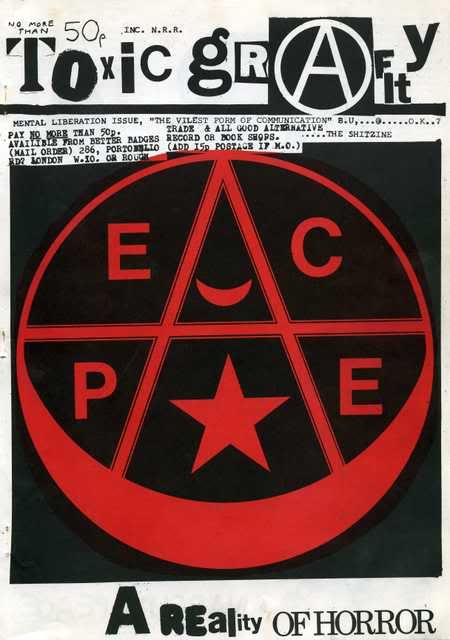
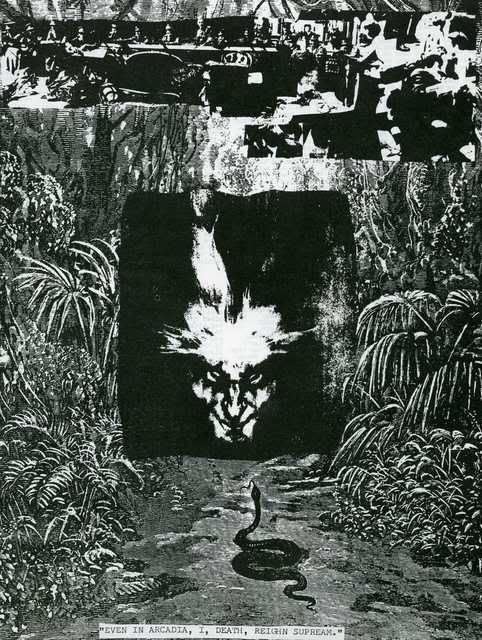
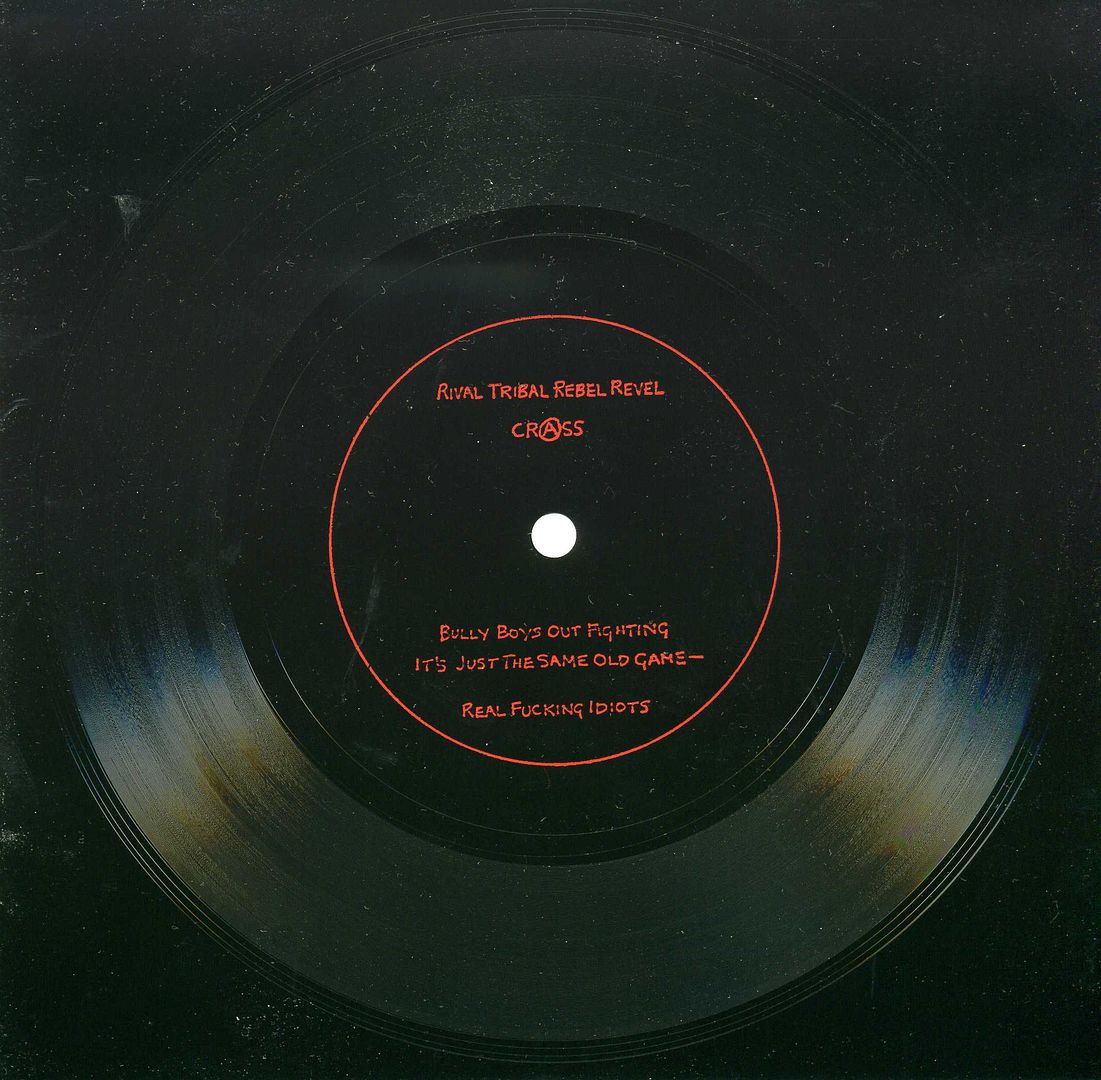
First pressing of flexi
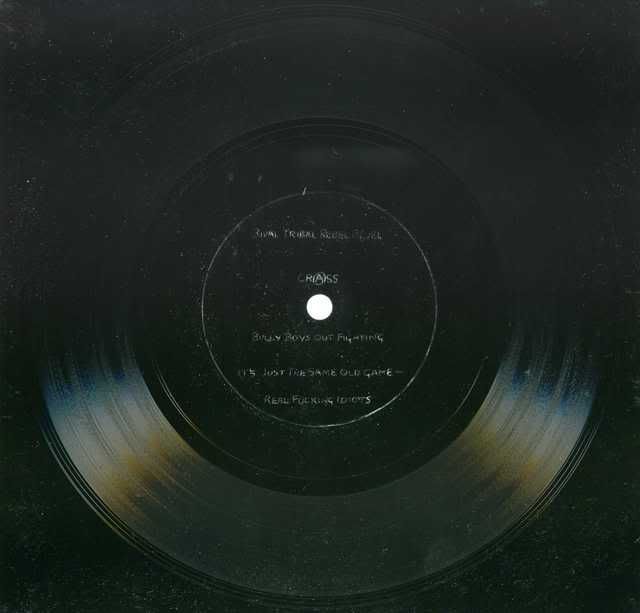
Second pressing of flexi
Crass – ‘Tribal Rival Rebel Revel’ flexi disc
This particular issue of Toxic Grafity is probably the most well known of the handful that were produced. It was also one of the best selling (of all fanzines, not just Toxic Grafity!) due to the free flexi disc of a (then) unreleased track by Crass being included.
It should be noted that Throbbing Gristle are also featured in this issue which was always a bonus for fanzines in the late 1970’s.
I am indebted to Toxic Grafity’s writer and editor, Mike Diboll for supplying the following information below on how this particular issue of Toxic Grafity got produced. All artwork on this post is from this issue of Toxic Grafity.
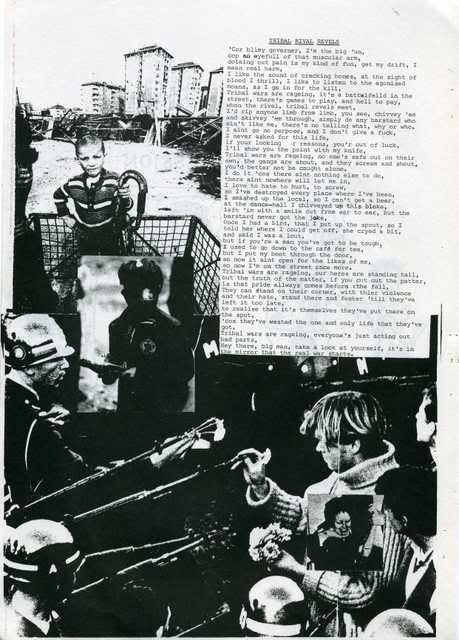
This edition of Toxic Grafity was put together while I was squatting in New Cross, south London and originally printed during late 1979, but it didn’t really get into folks homes until early 1980, when a substantial reprint was done. Originally 2,000 came off the presses, quite how many were eventually printed, I am not sure.
Joly from Better Badges (who also printed the first three KYPP’s fanzines, the last three were printed by Little ‘A’ Printers) used to always swing things so it seemed that I owed him lots of money (quite large sums for those days); I’m sure he may well have been diddling me, but that was my fault, because I was very naive in those days and thought that anything do with business, copyright etc, was bourgeois and reactionary, so perhaps I deserved it. Also, it must also be added that I was off my head a fair bit in those days, but of course so was Joly! Judging by the number of flexi’s that were sent to Better Badges, I suspect the actual print run was over 10,000, perhaps well over.
A year before the release of this particular issue of Toxic Grafity, in 1978, and also during 1979, there had been some really nasty rucks at Crass gigs at the Conway Hall in Red Lion Square in west central London. These rucks had mainly been fought between boneheads and bikers brought in by the SWP.
I can’t remember what the gigs were in aid of, but it was something the SWP had a hand in. The boneheads were used to pushing punks around, but got far more than they bargained for when taking on the bikers, some of whom were grown men in their 30s and 40s armed with bike chains, knives etc. After those experiences at there concerts Crass seemed to get a lot more edgy than they had been previously about sharing any sort of platform with members of the ‘hard’ left wing.
The lyrics to the Crass 7″ single ‘Bloody Revolutions’ is based on that feeling from the band around this time.
Basically it was the left wing causes that Crass would sometimes support, that seemed to aggravate the boneheads, and of course the boneheads would generally mill around the halls looking dangerous, and on occasions causing some real trouble.
Toxic Grafity didn’t really have those left wing associations, and (luckily) I also knew a few of the bonehead contingent quite well. I had always despised their ideology, but on a human level I was quite friendly with some of them. This I think helped diffuse things when Crass performed at the Toxic Grafity event staged at the Conway Hall late on in 1979.
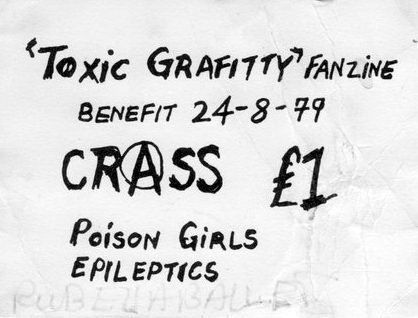
It was not a violent night at all, which was obviously good news at the time considering the previous gigs at the Conway Hall. There were of course some minor problems, but those situations were quickly nipped in the bud by some friends of my family that had come to witness the gig.
The flexi disc followed on from the Toxic Grafity benefit gig, it was Penny’s idea, he bought it up one evening at Dial House, the Crass commune, way out in North Weald, Essex.
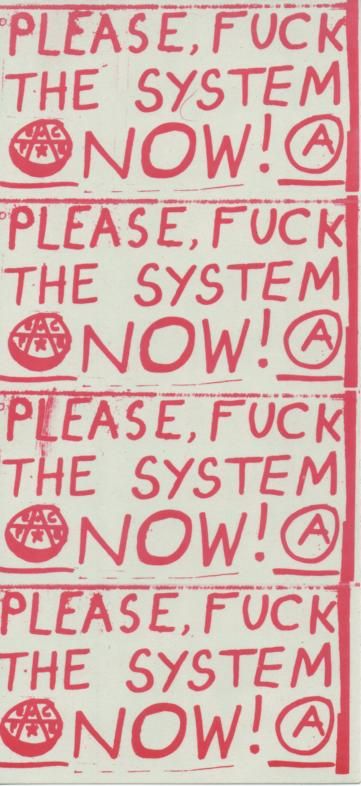
The original Toxic Grafity benefit was staged because of an incident late on in 1978 when I was pulled by the police in Soho, the seedier area of the west end of London. The police stopped me on one of those charges they used to pick punks and other ne’r-do-wells up on, the infamous SUS law. I had stopped off in Soho on my way back from a visit to Dial House, and had the artwork of an earlier Toxic Grafity on me. The police found this highly amusing, as you might imagine, destroyed the artwork, treated me a bit roughly, threatened me, and said that they’d put me on some sort of Special Branch terrorist watch list. Looking back on this as a 50 year-old I can see that this was almost certainly bullshit, but I took it seriously enough at the time!
As a result, Crass decided to help Toxic Grafity out (a previous issue had carried one of the first in-depth interviews with them), and the gig at the Conway Hall and the flexi disc followed on from that.
The track on the flexi disc, was not one of Crass’ more in-depth or enigmatic tracks, rather it was what it says it is, a protest against violent political sectarianism screwing up the young. Of course I was extramely grateful never the less.
I’ve repudiated so much of what I used to believe in during those days in the late 1970’s, but the closing words for Crass’ ‘Bloody Revolutions’ track “but the truth of revolution, brother, is Year Zero” still appeals to the Burkeian in me!
Joly at Better Badges did the litho printing for the fanzine and sorted out the badges. Southern Studios took care of the flexi disc by Crass, but I can’t remember where they had it pressed, or how many exactly were manufactured. The Crass flexi discs were written in red for the original publication of Toxic Grafity, others were written in silver for subsequent issues of the fanzine.
Eventually there were five Toxic Grafity fanzines that were produced and sold from 1978 – 1981.
Toxic Grafity issue 6 and 7 were planned and in large part nearly prepared, but I became a father in March 1982 (I’m now a grandfather, twice), and ‘reality’ stepped in quite soon after so all those projects were cancelled.
The later Toxic Grafity’s, including the issue above, had dropped the whole band interview thing and had became more like an anarcho-punk agit-art magazine, similar to what Kill Your Pet Puppy would evolve into.
By 1983 I was doing a lot of dispatching and also a lot of ‘white van man’ work until sometime in 1989. While doing these small jobs, a friend of mine, Wayne Minor (from Brixton’s 121 Railton Road bookshop) and myself brought out one issue of “The Commonweal” which was a more mainstream anarchist publication in 1985.
In 1989 I entered university as a mature student.
I now live and work in the middle east.
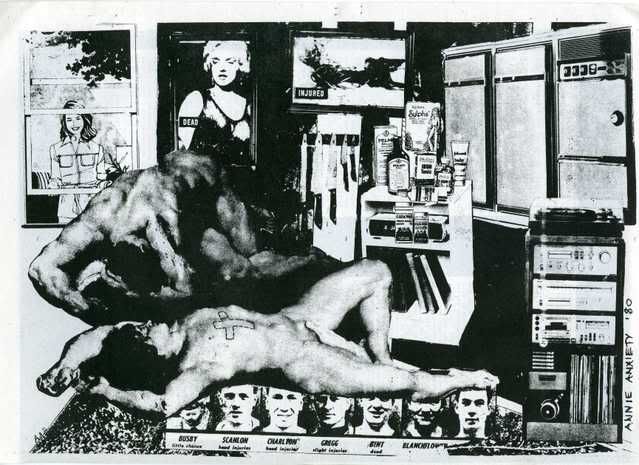
To advertise this issue of Toxic Grafity, Crass arranged to press up a few hundred vinyl copies of the same version of ‘Rival Tribal Rebel Revel’ to give to record stores that were ordering the fanzine in bulk. This was so the shop had a ‘hard’ vinyl copy that the shop could play rather than play the flexi disc from the fanzine if any potential buyers wanted a snippet pre buying the product.
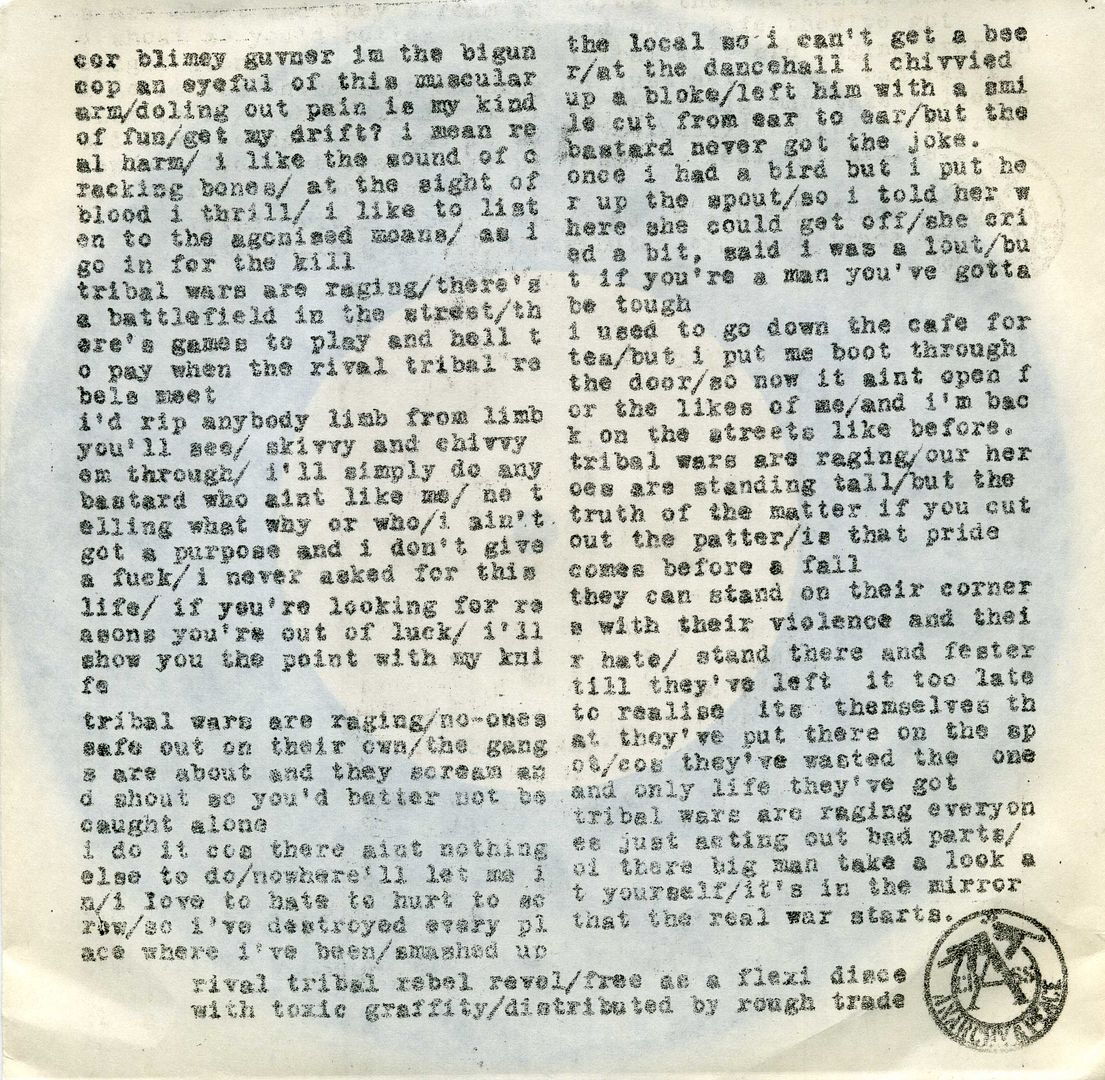
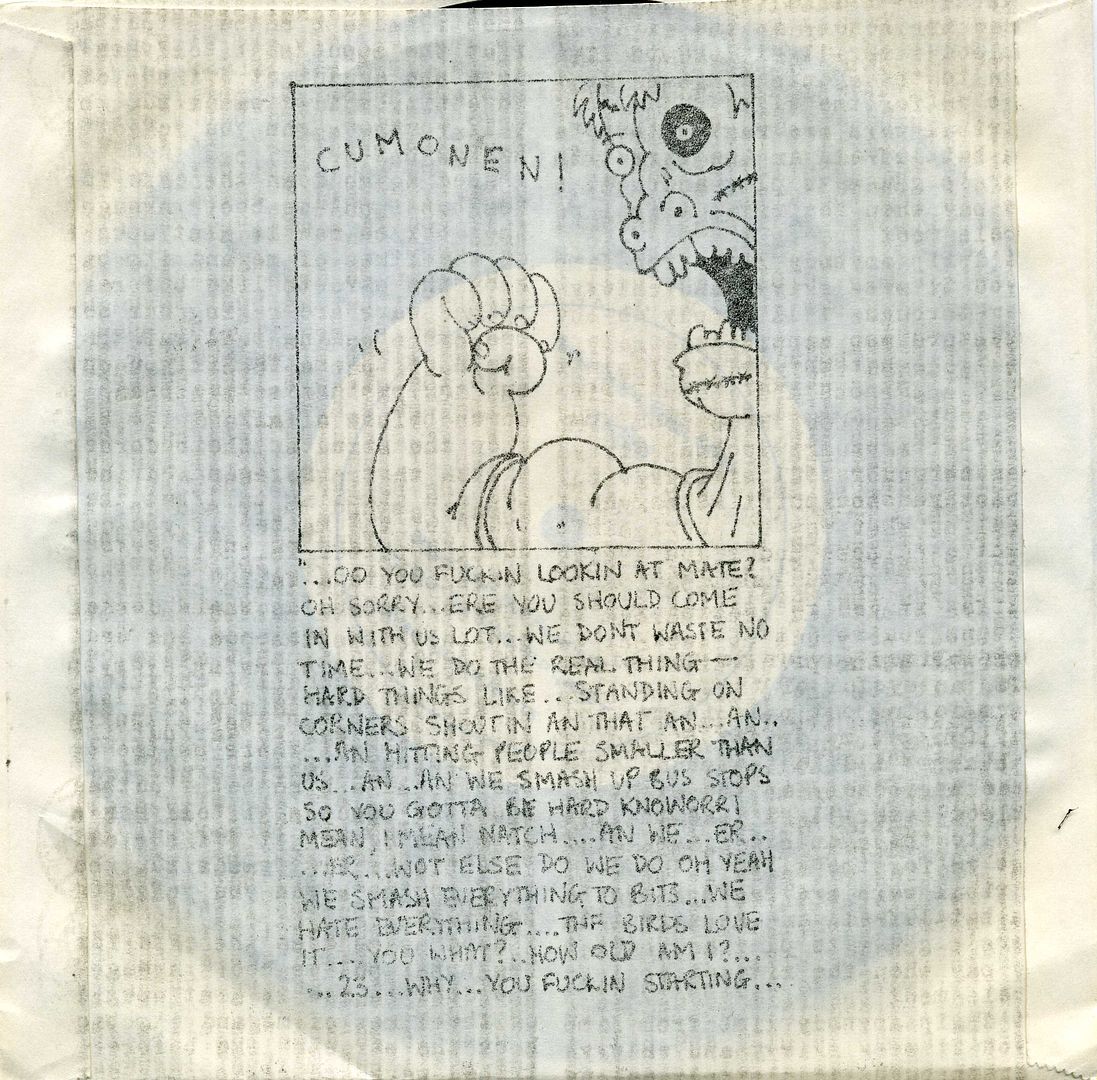
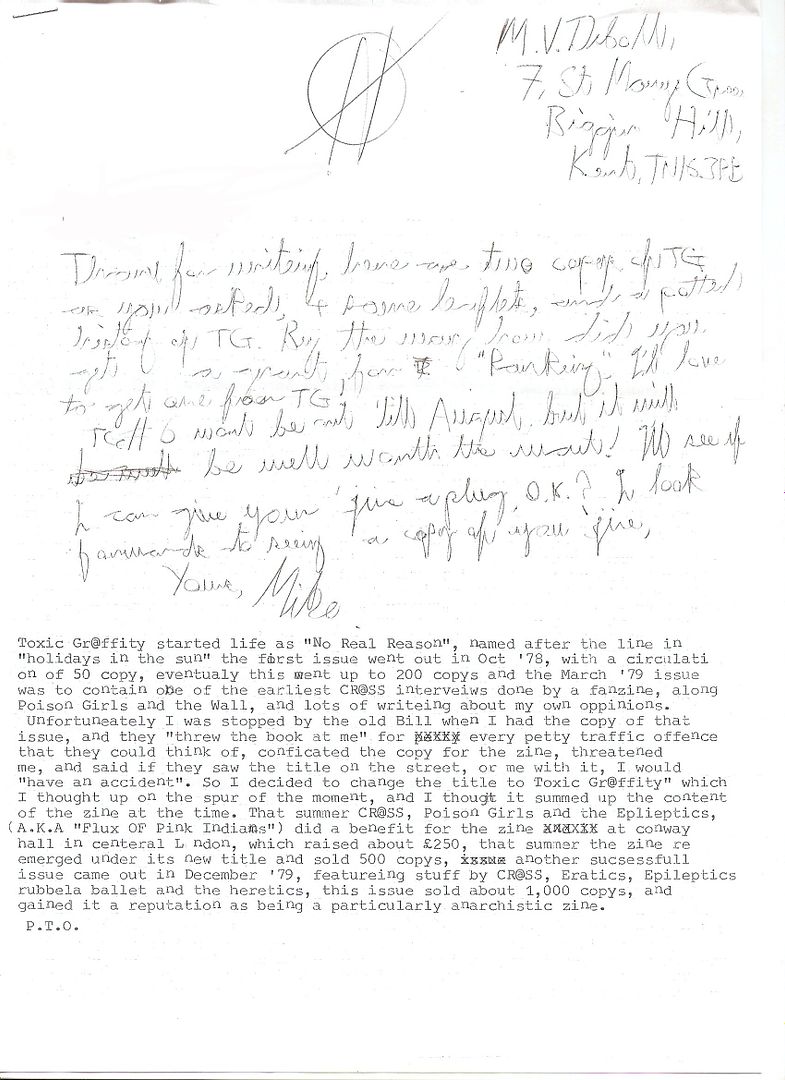
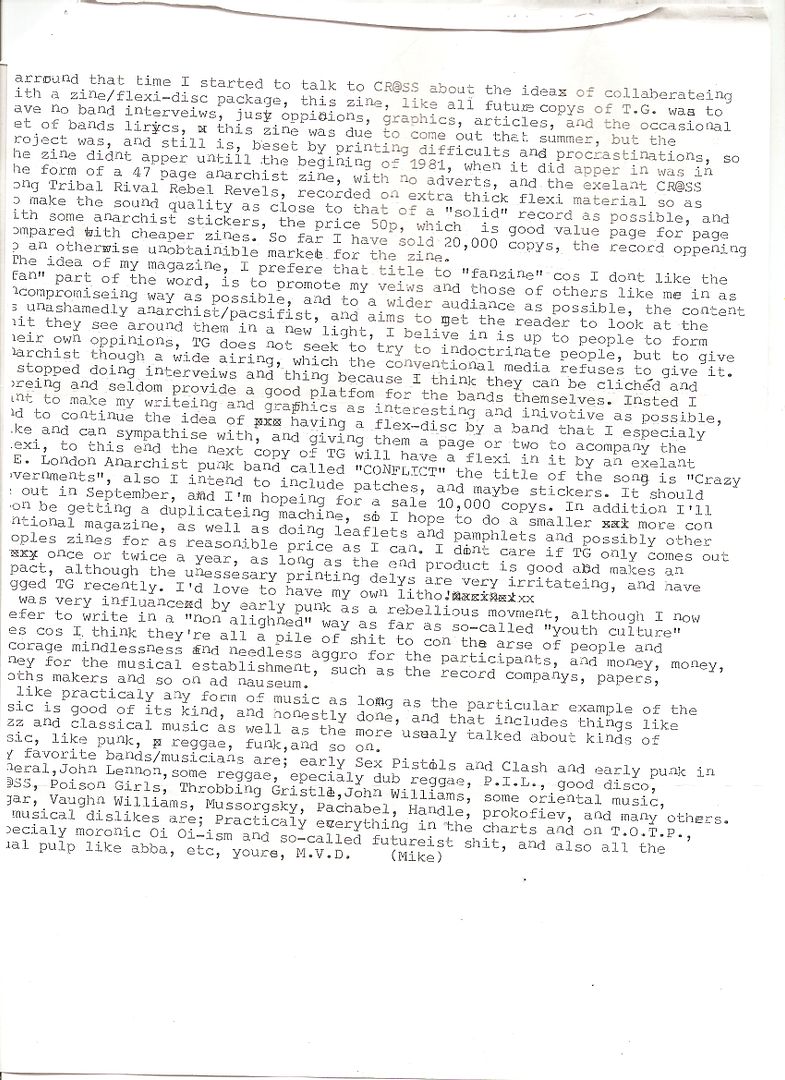
With thanks to Chris Low for supplying the personal letter from Mike to Chris
baron von zubb
March 5, 2009 at 11:56 amNot my business to go into your psychology Mike but you’ve mentioned something so.
Whatever did happen, it wasnt your fault.
Shit happens all the time. Its rarely clear cut as to how & why. Its often a set of circumstances.
I’m not saying we don’t have responsability at all.
We do.
But we’re not guilty.
As for ‘sin’?
With respect sir and as this is a discussion forum, I find it difficult to go with that.
Sin as defind by who? God? Theolegeons?
Obviously if your now a catholic you may have clearly defind parameters for that.
But I’ll state the obvious here.
All the holy books – regardless of which religion they come out of – were written by man.
To take the leap of faith that states god communicated them to mortals is diificult for an infidel.
Which of course is why i’m attracted to buddhism and have practiced meditation -no Samual not just ‘cos im the hippie you said I was…! But because it is an athiest philosophy, based on introspection & observation of mental attributes.
Sin as explained in buddhism is action caused by ignorance in the mind.
Mike Diboll
March 5, 2009 at 1:54 pmHi BVZ:
“Sin as explained in buddhism is action caused by ignorance in the mind.”
I don’t think I would argue with that at all. Both the Latin and the Hebrew traditions (and the Arab-Islamic one too) tend to express themselves legalistically in the first instance.
One consequence of this is that concept of “sin” is all too often understood, or misunderstood, simply as the transgression of divinely decreed “Dos and Don’ts.”
I think the mistake here is to then think that is all there is to the concept. Underlying the transgression itself is a state of mind of which the transgression itself is a symbol.
Take for example Adam and Eve’s sin in eating the apple (by the way I think that Genesis has to be understood for its symbolic, not its literal truth). One can focus on the transgression itself, but to do so is to trivialise the matter in hand: God becomes an arbitary tyrant because he punishes mankind for eating a piece of fruit.
But saying this is like saying language is meaningless by ignoring the symbolic content of language and stating that speech is just a series of hisses and pops made in the mouth.
Surely the sin in the case of Adam, Eve, Satan and the apple is lies in its symbolic significance, not the particulars of its signification. Thus, mankind’s real sin, his original sin, symbolised by Adam and Eve’s action, is our tendency to imagine ourselves to be God-like, accountable to no one but ourselves. We see this sin enacted by every dictator.
So leaving aside the word “ignorance”, I would concur that sin is fundamentally a state of mind. Buddhism tends to express itself more philosophically than the Latin, Hebrew, or Arabic traditions do (so, for that matter, does Greek Christianity). But Buddhist Koans can just as easily be interpreted in a boneheaded, literalist way as Biblical parables.
Likewise, just because Latin, Hebrew, and Arabic often express themselves legalistically, that doesn’t mean that they cannot express mystical and philosophical depth that rivals or exceeds that of Buddhism: Western Christianity had Meister Eckhart and Julian of Norwich; Judaism Isaac Bin Lauria and the Zohar; Islam Ibn Al Araby and Jalaluddine Rumi.
There is another definition of “sin” however that involves harm done to self and others through one’s actions or inactions, largley inactions in my case. Of this I am guilty and am in need of salvation. But the point here is not to dwell on the guilt (as many do), but on the salvation. Since this is nothing but healing, but a healing of the deepest and most precious kind. And with the healing comes learning, and this learning dispels the ignorance of which the Buddah (among others) spoke.
Ian S
March 7, 2009 at 1:53 pmUpdate on the talk about faked audio, including the Crowley/Enochian recording:
The talk was done last week to an audience drawn from the ‘Friends of the British Library’, who are people who pay an annual subscription fee to attend various events laid on for them. It wasn’t a public talk, but it was judged a success so will be repeated for the general public sometime within the next few months.
Previous talks under the heading of ‘forensic audio’ were open to the public although they had a more technical slant. One of the sound engineers reckoned the ‘Crowley’ recording wasn’t very well faked at all.
Some of you might remember the Jonestown Massacre recording, which was released by someone as an LP (iirc) and did the rounds among those into industrial music. That *is* reckoned to be genuine and does have a document history of sorts to back it up.
Audio fakes intended to deceive (rather than just entertain) seem to be very rare indeed, probably because they’re hard to make to a convincing standard. But there must be some examples of faked studio out-takes supposedly from well-known bands being circulated (vague memory of a Beatles fake along those lines).
chris
March 7, 2009 at 11:50 pmYes, the Jonestown Massacre LP was released as a picture disk by Jordi Vallis of Vagina Dentata Organ on his WSO label. IIRC it came with a wee sample of blood or something. Didn’t Young John have a copy? Think it was later re-released by PTV as part of their 23 albums series. The recording is most certainly genuine and there’s film footage of Jones’ deranged rant before the Kool Aid was ladelled out in that funny ‘Killing of America’ mondo docu.
Didn’t Got Told Me To Do It have something to do with that Beatles fake recording? Or was it just those practice sessions with the infamous Enoch Powell paraphrasing version of ‘Get back’ which had done the rounds before?
John No Last Name
March 9, 2009 at 12:25 amIt was the infamous Enoch Powell tapes bought at a bootleg tape stall on Portobello Rd, hyped up and sold to Garry Bushell when he was working at the Sun, don’t remember what the money was spent on, but it was considerably more than the tape cost.
chris
March 9, 2009 at 6:28 pmSurprised at Bushell falling for that one, or perhaps it was just a case of it being judged worth the cost for the papers it would sell. Those tapes have been ‘exposed’ more times than the little richard/marc almond ‘stomach-pumping’ story has been revised.
Ian S
March 9, 2009 at 9:49 pmThanks John and Chris, knew there’d been a kerfuffle over a Beatles fake, just couldn’t remember the details.
Heard a story from a sound recordist a few months ago, noted for doing a lot of wildlife work among other stuff.
A US-based computer games company emailed him to ask . . . did he have a recording of a sabre-toothed tiger they could buy to use for a new title?
He said, why yes, he had the very thing. (Old recording of a Bengal tiger he’d made on a visit to a zoo.)
John No Last Name
March 9, 2009 at 11:48 pmThe Beatles tape wasn’t a fake, it really is them playing songs from the Enoch Powel ‘Rivers of blood’ speech era with racist lyrics about immigrants. As Chris pointed out the tape has been around for ever, but with a new cassette case and a little GTMTDI hype it wasn’t too hard to make a good case to Garry for the lost Nazi Beatles tapes. I don’t think it was even anything to do with selling papaers for him, I think he just wanted to annoy Sir Paul.
alistairliv
March 10, 2009 at 8:11 amThere is more on the Nazi Beatles tape here
http://www.bigozine2.com/features05/BEAsongs.html
It says “It was only in 1986 that bootlegs featuring “No Pakistanis” were made public. As expected, McCartney was heavily criticised for his alleged racist tendencies. Although McCartney denied the accusations, the controversy failed to subside for a few months. “
Ian S
March 10, 2009 at 11:13 amAh right, so it was for real then. (Maybe I’m getting it mixed up with something else.)
andus
March 10, 2009 at 11:17 amSo. John Lennon and Paul McCartney had pictures of Adolf Hitler in their houses, and a nazi shrine at the bottom of their gardens. fuck. they’re everywhere these people. jesus.
Seriously though The beatles admitted years ago that the song was about Enoch Powell, A parody apparently, the original lyrics were dropped to prevent misunderstandings.
andus
March 10, 2009 at 11:29 amAround the time he was developing the lyrics to “Get Back”, McCartney satirised the “Rivers of Blood speech” by former British Cabinet minister Enoch Powell in a brief jam that has become known as the “Commonwealth Song”. The lyrics included a line “You’d better get back to your Commonwealth homes”. The “Commonwealth Song” had no musical resemblance to “Get Back”, but gives insight into the thinking behind the song’s lyrics. On 9 January the group introduced what has become known in Beatles folklore as the “No Pakistanis” version.[6] This version is more racially charged, satirising right wing attitudes – (we) “don’t dig no Pakistanis taking all the people’s jobs”.[7]
The song was further developed into what McCartney described as a “protest song”, and in subsequent rehearsal takes (one of which John Lennon sings) the immigration theme is developed into a full verse. By mid-January the song had developed into three verses: The first being the “Loretta Martin” verse, the second being the “Jo-jo” verse and the third the “Pakistanis verse”. Whilst heard by Beatles fans on bootleg for over a decade the lyrics to the third verse are not widely known:
“Meanwhile back at home there’s nineteen Pakistanis,
Living in a council flat
Candidate for Labour tells them what the plan is,
Then he tells them where its at”
Another version of the “Pakistanis verse”, in what is claimed to be the entire song in John’s handwriting, is on display in the Hard Rock Cafe in San Francisco. In this version, the Pakistani verse is:
“Meanwhile back at home too many Pakistanis,
Living in a council flat
Candidate Macmillan, tell us what your plan is,
Won’t you tell us where you’re at”
In an interview in Playboy magazine in 1980, Lennon described it as “…a better version of ‘Lady Madonna’. You know, a potboiler rewrite.”[8]
On 23 January the group (now in Apple Studios)[9] tried to record the song properly; bootleg recordings preserve a conversation between McCartney and Harrison between takes discussing the song, and McCartney explaining the original “protest song” concept. The recording captures the group deciding to drop the third verse largely because McCartney doesn’t feel the verse is of high enough quality, although he likes the scanning of the word “Pakistani”.
wikipedia
baron von zubb
March 12, 2009 at 7:27 pmInteresting post Mike
“There is another definition of “sin” however that involves harm done to self and others through one’s actions or inactions, largly inactions in my case. Of this I am guilty and am in need of salvation. But the point here is not to dwell on the guilt (as many do), but on the salvation. Since this is nothing but healing, but a healing of the deepest and most precious kind. And with the healing comes learning, and this learning dispels the ignorance of which the Buddah (among others) spoke.”
Absolutely.
Surely you/we were only guilty of ignorance? Not of bad or evil sentiments & desire to do harm to others.
I will agree to the concept that some peoples ignorence has become so embedded and thus hard to recognise as such.
But are they not capable of redemption/knowledge.
And this or the beatles fakes?
Take your pick punksters.
Ian S
March 13, 2009 at 10:45 amBeatles fakes for me, I’m not a spiritual person BVZ. Each to their own.
andus
March 13, 2009 at 11:13 amSo if committing a sin involves harming oneself. what does that make Jesus, after all he deliberately got himself crucified, apparently.
As for this chap The Buddha, he was a creep if there ever was one, all misery is caused by desire, really, desiring the end of slavery, a starving person desiring food, desiring things only creates misery if you do not obtain the desire.
If people stopped desiring things, would they be able to exist ?
As for all these mysterical enlightened monks, are they not really a bunch a selfish lowlifes, after all what they do is just for themselves in most cases, was it religious people who ended slavery, was it religious people who got rid of Hitler, was it religious people who got ride of child labour. etc etc, did any of these religious vermin create any of the human rights we enjoy today,
You’ll find more enlightment in your pet dog ( puppy ) than any of these devious creeps.
Mike Diboll
March 13, 2009 at 12:48 pmIan:
I’m all for the “trivia” aspect on these postings, but let’s keep it focused on stuff that is/as relevant to us circa 1976-86. The Beatles “Paki” stuff (is one allowed to say that?) is well-trodden ground and can be followed more profitably elsewhere. A bigger point is that looking back to the “old days”, I now see that a big part of my motivation was an intense interest in “big picture” ideas, politics, religion, &ct that has lasted me all my life. This is a legitimate part of what we were about, so reflecting on what we thought then,what has changed, and what has stayed the same is a legitimate part of what this site is about. That’s my view, at least.
Andus:
You’re dead wrong about slavery: both in England and the USA, abolitionism was intimately connected with religion, the impetus for abolition coming mainly from nonconformists, evangelical Protestants, Quakers, and Unitarians. Read any history of the period. Secularists generally swallowed hook, line and sinker pseudo-scientific racist arguments that objectified Blacks and others so that they ended up being seen as just another commodity, so much coal to be consumed to produce the energy necessary for production. This is the mentality Swift (an Anglican priest) saterises in “A Modest Proposal”, which touches on both slavery and child labour. Religious radicals were also prominent in resistance to the latter.
Opposition to Nazism is a more complex question, but thousands of people went to their deaths in Nazi Germany on account of their religious opposition to Hitler and the Nazis. But Dawkins and others who blame religion for everything are clearly in the wrong. It was secular ideologies, Capitalism, Fascism, Maoism, Nazism, Stalinism that made the C20th the bloodiest and most miserable in human history. No doubt the anarchists would have added their ha’penth worth if they’d had the chancce.
Jesus didn’t “deliberately get himself crucified”, he was arrested, tried before the Roman governor of Judea, and executed in the traditional Roman manner. Like Socrates, he didn’t violently resist capture and execution, but that’s not the same thing as “deliberately getting himself executed.”
That desire brings misery because desire can never be satisfied is precisely the Buddha’s point. His solution is that desire should be side-stepped. It’s slightly different to the Christian one (that desire should be controlled by and act of conscious will), but the idea that desire is not in itself a good is shared by both religions.
There is nothing radical about being a partisan for unfettered desire. This is the bland, hum-drum imperative of consumer capitalism, which has at its very heart the creation of endless new insatiable desires. Britain today is scarred by the moral consequences of this: one kid stabs another for a pair of trainers; a man desires a woman so he takes her, uses her, then kills her.
BVZ, I think that whether a bad action is done from ignorance, or out of an inclination toward evil is often a matter of perspective.
For instance, the inability to empathise, and therefore understand the suffering of others, is a fault which lies behind the actions of the very worse people in history and in society, be they politically motivated mass murderers, or serial killers, sadists and similar types of nonces.
This fault can be understood either as a form of ignorance (ignoring, wilfully or otherwise the suffering of others), or as evil. The difference is largely one of perspective.
Re:
“I will agree to the concept that some peoples ignorence has become so embedded and thus hard to recognise as such.”
This is interesting. In his “Confessions” St. Augustine stressed how evil was not an abstract force outside of one’s self, but as the influence of one’s past over one’s present, and of the force of habit, one’s “second nature”. This we have the power to control, though often we chose not to, and this is what determines the quality of our moral choices.
“Habit was only too strong for me when it asked: ‘Do you think you can do without these things?'”, wrote Augustine in his Confessions. Surely a message for our time?
I remember the time when I first seriously began to question whether or not Crass were as right on as I had thought they had been (this was the start of my deprogramming). It was at Dial House one afternoon. I was surprised that one of them had used a quote from a cardinal writing in “La Vie Catholique” to back up her anti-bomb arguments.
Almost instinctively, I let rip with the sort of “fuck God” rhetoric you find in Crass tracks like “So What?”. To my surprise, some of them turned on me quite strongly, and none of them defended me. That made me realise that “So What” &ct were a pose, which many of them at least didn’t really believe in. I felt angry and cheated because I had taken a position (a leap of faith if you like) based on their public rhetoric; now I knew this is not how they really thought (some of them at least), and I felt I had been misled on a very serious issue.
I shouldn’t have been surprised, since I later learned that religious people had been prominent in the founding of CND and similar movements, just as their ancestors had been involved in abolitionism, &ct.
Ian S
March 13, 2009 at 3:44 pm“I’m all for the “trivia” aspect on these postings, but let’s keep it focused on stuff that is/as relevant to us circa 1976-86.”
Ok it was getting derailed a bit heh heh.
“A bigger point is that looking back to the “old days”, I now see that a big part of my motivation was an intense interest in “big picture” ideas, politics, religion, &ct that has lasted me all my life.”
There’s a page in TG5 in which that came across clearly, even to me as a teenager. It’s the one with the photo of the deformed child, and you wrote something underneath expressing anger at that: the old question of why innocents suffer.
Usually people ask that when confronted with the results of human cruelty, but the way you were writing suggested you saw that cruelty as worked into the fabric of nature, or at least wondered if that was so.
It’s a good question to ask imo.
Graham Burnett
March 13, 2009 at 4:29 pm‘So What?’ was I believe the first or second song Steve Ignorant wrote, and it was a response to/inspired by reading Penny’s ‘Christs Reality Asylum’. I’ve since seen something either in George Bergers book or maybe Ian Glasper’s book, or somewhere else, that for him it was about overcoming his own conditioning, apparently he was an alterboy or somesuch and had all that religious ‘stuff’ about guilt and sin hardwired into him as a child. He said that when he first wrote down the words, and even the first few times he sung it on a stage, there was a part of him that really believed he was going to be struck down by a thunderbolt. When that didn’t happen he felt in some way ‘free’, and saw that the church was just a confidence trick and didn’t have a hold on him at all beyond what was in his head. I always saw that as being more about where Crass stood on organised religion, and it was bourne out when I interviewed Crass for New Crimes back in 1980, I asked why that their attacks on Christainaity were so virulent when Jesus was probabaly just as much an anti-authority/revolutionary figure in his day as they were in the 70s. The response was that they weren’t intending to attack Christ the man so much as as Christ the idea, or what the State and organised religion had made the figure of Christ into, complete with all that internalised guilt, justification of war, oppression of women, abuse of the power of the church etc.
Mike Diboll
March 13, 2009 at 7:18 pmHi Ian:
Thanks for your last post, and especially the reminder about the image you mentioned in TG5; it’d totally forgotten about that.
Yes, the idea of suffering as an integral part of nature is an interesting one. More than that, it (“theodicy” or “the problem of evil”) one of the fundamental problems of philosophy. Wikipedia offers a fairly good primer:
http://en.wikipedia.org/wiki/Theodicy
The Christian answer is that suffering has meaning and purpose. That’s not to say that suffering is good, or good for you — it isn’t, otherwise it wouldn’t be suffering, it’d be something else.
It is to say that God, or Christ as God made flesh, is present in all suffering. That God is with us when we suffer, that he was there at Auschwitz, Treblinka and Hiroshima; that when we suffer we are closest to that which is beyond us. More than that, that our suffering is God’s suffering, that all human pain is felt and suffered by God as Christ. In this is meaning and purpose, it is in this way that we undergo “theosis”, that become God-like.
Like Rushdie, I’d always had “a God-shaped hole in my heart”, that yearning for something beyond me. My path to Christianity was a hard one, at every point I resisted (and probably still resist) God’s approaches to me. In my punk days it was because Christianity was “the system” and therefore it had to be wrong. So I looked elsewhere for God, again and again. but his call brought me home.
Mike Diboll
March 13, 2009 at 7:34 pmHi Graham, re:
“He [Steve Ignorant] said that when he first wrote down the words, and even the first few times he sung it on a stage, there was a part of him that really believed he was going to be struck down by a thunderbolt. When that didn’t happen he felt somehow ‘free'”.
As a schoolboy I once read a book called “An Introduction to Witchcraft”, or some such title, that advocated the crucifixion of toads or reciting the Lord’s Prayer backwards for much the same effect.
One is also reminded of Yuri Gagarin, the fighter pilot strapped to an ICBM, who was asked when he’d achieved orbit to peer out of the port hole and see whether he could see God. “No” he said. Well what a surprise!
Once a gang of us were in the back of a national coach going from one Crass gig to another, high on cheap booze and speed. We noticed a man of the cloth in his dog collar next to us, and began to sing the lyrics to “So What?”
He seemed very intimidated and began earnestly to read his Bible. He shouldn’t have been, we were a bunch of tossers who couldn’t punch our way out of a wet paper bag, but he didn’t know that, and we probably looked more intimidating that we actually were.
What brave soldiers for the cause we were. Were we really any different from the boneheads we purported to despise? I doubt it. And I really do ask God’s forgiveness for this stupid incident.
Re the incident at Dial house with Crass, perhaps “Crasstianity” had different levels of initiation, like certain Kabbalistic or Sufi sects. So that the “truths” understood by the masters were different from or even opposed to their public rhetoric. Perhaps I revealed myself as being a Crass neophyte by my silly mouthing of their silly lyric. Or maybe having made their point they didn’t want to be typecast as the “fuck God” band.
In reality, I think these sorts of issues were always a source of tension within the band, between Steve and yer actual punks, and the public school and college educated ones, what ever the public show of unity they put on at interviews.
It spurred me to go on and get an education though, so that nobody else could bullshit and patronise me again!
Graham Burnett
March 13, 2009 at 8:15 pmHi Mike – Re intimidating punks – personally I never really got the whole thing about punks being regarded as ‘threatening’, at least on a physical level – there were a few Sid wannabes in our crowd down in Southend, but most were, generally speaking, more kind, gentle and thoughtful than many other people of our age group – generally we were ‘outsiders’, more questioning than say, ‘the disco kids’ around us, and certainly more interesting taste in music. Many of us were vegans or vegetarians, concerned about peace and broadly CND/peace movement supporters, interested in anarchist ideas however naive that anarchism might seem now, experiemnting with communal living whether in squats or shared houses, relatively well read, creative whether it was through music, writing, art, doing zines, putting on gigs, etc, etc. Thats why it always made me a bit sad that so many ‘normal’ people would stereotype us as mindless violent thugs, when it was actually the nice smart ‘casuals’ who would as soon stick a knife in you as look at you, or give you a kicking if they happened to come upon you walking home from the pub late at night.
I particularly remember 3 of us with our dreads, spikey hair and mohicans, ripped clothes and Crass teeshirts being in Prestos supermarket buying cider one day – a little boy pointed at us and said “look mummy that man has got green hair”. The mother went ashen with fear and through gritted teeth half whispered “Just don’t say anything” as she quickly dragged him away from us… What was all that about??? Of course if we’d had expensive trainers, pringle jumpers and nice wedge haircuts we wouldn’t have been percieved as threatening at all…
Re Crass – personally I never percieved them in the way that you and others seem to have done, never got that ‘Crasstianity’ thing or the stuff about initiation or Crass being a ‘sect’, I just kind of clicked with alot of the ideas they were expressing – they came along around the time I was getting disillusioned with the SWP who I’d gotten involved with via Rock Against Racisim after leaving school, and the ideas just made sense – still do, especially the bit about ‘there is no authority but yourself’ which I took to be about taking personal responsibility rather than buying into ‘blame culture’. I never found anybody at Dial House to be bullshitting or patronising towards me, though I only really got to know Penny, Gee, Steve and Bron, and still count them as friends, and have had alot of direct input into Dial House over the last few years, eg, running courses there, building a compost bog, building a new classroom, etc, etc. Of course Pen talks bollocks sometimes, but don’t we all?
Mike Diboll
March 13, 2009 at 8:29 pmHi Graham,
I too travelled a similar path via the ANL, RAR &ct towards Crass, Anarcho-Punk, &ct. And I know what you mean about the peaceful punks as “outsiders” thing. But I also know that there were moments when what I’d call the dark side of human nature took over. . . .
Re:
“Of course Pen talks bollocks sometimes, but don’t we all?”
Absolutely! What kind of person would I be, what sort of ex-punk would I be, if I claimed never to talk bollocks (see my earlier apology to Joly/BB).
Also re Crass, no hard feelings at all on an individual, personal level. But I do think they had a kind of corporate responsibility to young and impressionable that they never fully admitted to or lived up to (you have to remember i’m talking as a teacher!), and they got kind of dysfunctional (as a band) toward the end.
I’ve written a lot about what I no longer believe from those days, but there’s still quite a bit I still suscribe to, albeit in a very different way: is capitalism and human greed ruining the planet? Yep!; Is politics and government an evil? Yep, although I’d now say its a necessary evil. Does some generalised malise (the system? original sin?) prevent most of us from meeting our full potential? Yep! Are young people today being sold down the river? Yep! &ct., &ct!
Nic
March 14, 2009 at 11:59 amMike – Your distinction that it was ‘religious radicals’ who contributed to the fight against slavery is interesting. While it is very true that ‘religious radicals’ played a key role in the elevation of rights for individuals on many levels, it is also worth remembering that the wider reach of ‘organised’ Christianity operated as a supporting pillar for the maintenance of that denial of rights (perhaps due to the notions of ‘chosen people’ in the early books – Exodus, Deuteronomy – of the Bible?). Whilst religion (in this case, Christianity) is in no way solely responsible, it DID play a role – and it would be disingenuous to suggest otherwise.
Even back then (in the ‘Good/ Bad Old Days’), there always seemed to be a very strong parallel between Christianity and ‘Anarchism’. One of the core elements of ‘Anarchism’ always seemed to be an inner battle with one’s desires and the implications of pursuing that desire – the idea expressed by Flux of Pink Indians to ‘strive to survive causing the least suffering possible’, that one would consider each desire before it translated into action and act in accordance with that reflection. In this sense, there are strong parallels with aspects of Christianity (and other religious faiths – thinking of the Jihad al-Nafs in particular).
I could understand why ‘Anarchists’ might be strongly opposed to ‘organised’ religion, but could never understand why they refused to engage with the content of the 4 Gospels, particularly as they contained many ideas which would seem to be in perfect accord with ‘Anarchist’ thought. It seemed clear that there is a strong distinction between the original impetus of the tenets of Christianity (as expressed in the 4 Gospels) and the outcome of centuries of ‘organised’ religion: consequently, it never felt like an ‘issue’ for me (unlike many ‘Punks’ who – perhaps – had experienced a greater sense of powerlessness in the face of religion). Where Crass (well, probably, Penny Rimbaud) saw Christ as a figure of arrogance and self-seeking suicide, I felt that the example expressed through the life of Christ was – in itself – quite pertinent.
Perhaps this lack of engagement could be understood to be a direct result of the need for an exploration which would conflict (at some level) with the simplistic poles of Good / Evil which informed much of the ‘Anarchist’ thinking prevalent in the ‘Crasstafarian’ years (and which also informs certain schools of religious thought)…
Having said that, I have absolutely no religious (or mystical) leanings: the beauty of being alive is enough.
I think all people have an example from their own actions similar to your intimidation of the man on the coach, Mike: we have all acted thoughtlessly (particularly in our younger years) – and often in order to increase our own sense of our power. I seem to remember ‘Punks’ would often pick on religious figures, perhaps because they understood that focusing on these people would not lead to a threatening confrontation – in this sense, they were exercising power in exactly the same way as the culture around them.
Funnily enough, there was an interesting documentary about ‘The Satanic Verses’ on the BBC last week. It illustrated quite nicely how Rushdie’s ‘God-shaped hole’ vanished as soon as his venal attempt to escape from his self-inflicted position was seen for what it was by those he was addressing.
A much more interesting idea which the programme touched upon was the way in which ‘The Satanic Verses’ helped to unite the disparate groups of Muslims in Britain and gave them a much more cohesive voice. Almost immediately afterwards, the Muslims in the area I lived in began to undertake night-time vigils to coerce prostitutes to leave the area, and one wonders if this was a result of the galvanising force of the protest related to the book…
Sam
March 14, 2009 at 3:58 pm“One of the core elements of ‘Anarchism’ always seemed to be an inner battle with one’s desires and the implications of pursuing that desire – the idea expressed by Flux of Pink Indians to ‘strive to survive causing the least suffering possible’, that one would consider each desire before it translated into action and act in accordance with that reflection.”
The term ‘denial’ wasn’t in common usage at the time but it does explain a lot. Dunno about ‘causing the least suffering possible’ though. The witch hunts and castigation of those who continued to pursue their desires was horrible. Very puritanical. Lord of the Flies springs to mind again.
Mike D
March 14, 2009 at 5:57 pmSam, you took the words right out of my mouth with “Lord of the Flies” with respect to Nic’s last posting.
Nic, I take your point about /jihaad an-nafs/ in Islam. But really, it’s a case of “been there done that” with me. All the time I checked for Islam I realised that I was still putting on an act, was still the old “fuck you” punk underneath, the very opposite of “struggle against the self”.
This is because with Islam I could still pepper my speech with “in” jargon to show how different and better I was to everyone else, still dress up in unusual clothes, and do odd things in public (prayer time anybody?), peddle intercene sectarianism radical Muslims have nothing to learn from the trots in this regard), and still mouth extremism (poor old Islam vs the West, the Kuffaar system, &ct).
In the end I found it was only through Christianity that I could be genuinely religious, partly because it was “normal”, mainstream, part of the system &ct., and didn’t involve dressing up, circumcising one’s self, praying in public, &ct. Once all the “hey look at me” nonsense was out of the way I could really get on with the jihad against my nafs.
Once I’d got that far, I discovered something else, a depth I’d never found anywhere else.
I do take your point about Christianity’s chequered past politically, but I still think most of the posts so far have taken the jibes about “organised religion” uncritically. Religion ought to be organised, since it is only through having the humility to submit to some sort of higher authority that we can break free of solipsism and self-referentiality.
I too used to see the clear parallels between Christianity and a certain sort of anarchism, but I foolishly deferred to those (Crass and others) who seemed to know more than me, and went along with all that fag-end of the French revolution “fuck God” stuff. and all that helped draw attention to me, which what really more than anything else I wanted.
A revolution by us lot? Lord of the Flies indeed!
Mike D
March 14, 2009 at 6:16 pmHi Nic,
That all said there is a lot to be said for the comparatist approach. Out here in the Gulf I do a Comp. Lit. course, a broad historical overview. I’ve just done the blood ‘n’ guts stuff, pre-Islamic /jaahiliyyah/ poetry compared and contrasted with Anglo-Saxon lit. (Beowulf, the Battle of Maldon). Next I’m going ffw a few centuries to the late Middle Ages where I’ll be doing the comparative/contrastive stuff with Julian of Norwich and the Sufi genius Muhiyy-ud-deen Ibn ‘Arabiy. I hope to end with postmodernism in English and Arabic lit., perhaps ending with Rushdie, if I can wangle it.
I think you’re too hard with SR, BTW. Don’t talk to me about Islamic anti-prostitution vigilantes. Out here all the hotels transform into out-and-out brothels over the weekend, even the respectable five-stars. Guess who the clientele are? Generally, they’re not Westerners but “tourists” come over the causeway from Saudi. Perhaps its to do with the essentially contractural nature of sharia marriages out here?
Nic
March 14, 2009 at 7:06 pmI agree completely that the ideal and the reality of ‘Anarchism’ rarely meet (as is the case with Islam as you noted Mike – spending the best part of 15 years living in a predominantly Muslim community made that fairly transparent), and wasn’t suggesting anything other than it is interesting to draw parallels and wonder why those parallels were rarely explored…
An interest in both Crass and ‘Anarchism’ (which was never at the exclusion of an interest in anything – and everything – else) didn’t stop me or my friends from having an absolutely fantastic time that involved little in the way of ‘denial’…
Interestingly, we rarely encountered the dogmatic power games which seem to have been common in London: it’s worth remembering that the experience which you had in London doesn’t necessarily speak for the experience of others (however interesting it is!)…
The Comparative Literature course sounds very interesting, Mike: my first degree was in English Literature and Philosophy…
Do you touch on ‘The Dream of the Rood’?
alistairliv
March 15, 2009 at 11:35 am“The earliest written English poem is the ‘Dream of the Rood’ inscribed in runes upon a stone cross in Scotland.” http://www.umilta.net/hilda.html
The cross is at Ruthwell (about 30 miles from where I live) and I have seen it. To see the actual 1300 year old runes on it is quite something – even my brother who is def. atheist was gobsmacked/ awestruck when we saw them,.
The Ruthwell Cross is relevant to this discussion since it is an actually existing piece of history which has been relegated to the sidelines because it doesn’t quite fit within English history (since it is in Scotland) or Scottish history (since it is ‘English’/ Northumbrian/Anglian)… so it remains in obscurity.
It is fairly easy to see why the Ruthwell Cross is a problem given the continuing ideological/ nationalist importance of Scotland v England interpretations of history… but where is the ideological tension when the recent history of anarcho-punk is being discussed?
Is there a parallel between disputes over the central role ( or otherwise) of the Sex Pistols in ‘creating’ punk and with Crass/ anarcho-punk?
With the Pistols there is a mystification which revolves around the notion of punk as an “authentic” outburst by alienated working class youth set against the ‘inauthentic’ nature of hippy counterculture as a middle class youth movement.
But at the same time the Pistols were deliberately constructed/ manufactured by Westwood/McLaren/Reid as a spectacular pop culture entity – designed to provoke outrage. Therefore punk was neither spontaneous and nor authentic, it was – for anyone who had studied previous youth subcultures as Mclaren had – entirely predictable and followed the same subcultural trajectory as teds, mods, hippies…
So was anarcho-punk different? Was it constructed by Crass following the Sex Pistols model? And did it follow a similar subcultural trajectory?
A critical difference would be the extent to which anarcho-punk was actually political, the extent to which it absorbed and reproduced anarchist theory and practice. This I think is where the ‘mystification’ exists, where the ideology conflicts with history.
The anarchism of anarcho-punk was an ahistorical afterthought… as Penny Rimbaud says in ‘The Story of Crass’ p.128:
“I wasn’t aware of anarchism until about one year into Crass. I knew what it meant in the lose term of the word before, but in terms of a label,it was more by default…we put up the ‘A’ banner to get the left and right off our backs. It was then we started getting asked what we meant by that …I didn’t know what the fuck it was about.. [when] I started looking at what it actually meant in terms of its history. I hadn’t actually that much interest in it and I can’t say I have now to be honest ”
There are similar quotes from Steve Ignorant (p.127/8) and Andy Palmer (p.129).
This original absence of anarchist historical consciousness became an obstacle once the process of subcultural decay set in. A form of punk anarchism had been created, but in isolation from ‘mainstream’ anarchist history/theory/practice it withered on the vine.
Mike Diboll
March 15, 2009 at 1:32 pmNic & Alistair:
I have taught the “Rood” out here, but not on the comparative course I mentioned earlier. I like doing Old “English” stuff and the Middle Ages because (a) it’s often ignored (even here in the UK), and (b) going back to the roots (real or “imagined”) of a culture or a society help create a more profound cross-cultural understanding.
The big issue out here with both the Rood and Julia(n) of Norwich is helping students to get to grips with the Christian concepts underpinning Medieval poems such as these. Remember I’m working in the national university of a Gulf state, and students here come with preconceived ideas about the Western “Other”, just as Westerners back home in the UK have their preconceptions and stereotypes.
My personal beliefs &ct put to one side, the aim of such courses is to create genuine insight and (hopefully) mutual respect between cultures. Often it is easier said than done!
This comes to the fore even more so when we get to the Englightenment &ct, as this is really when Western and Arab-Islamic cultures become radically different. Prior to that, one could argue that both cultures had more in common than separated them.
Both were once “barbarian” peoples (the Arabs and the Germanic tribes) who became successors to different parts of what had once been the Roman Empire; both had similar kinship-based and feudal or semi-fuedal methods of social organisation; both were fundamentally faith-based societies that attained “civilization” through the adoption of monotheistic religion (or different versions of the same monotheistic religion?), &ct. With the Englightenment, things change markedly.
Mike Diboll
March 15, 2009 at 1:50 pmAlistair’s point about the development of anarcho-punk is very interesting. At the time, I never imagined it (or the Crass version thereof) to be quite so radically detached from the “historical consciousness” of anarchism and that key members of Crass really knew bugger all about it.
Certainly for me, and many of the people I knew at the time, Anarchism was a mast that we had nailed our colours to, despite the fact that we were profoundly ignorant of the superstructure that mast was itself nailed to. Now I learn that it wasn’t nailed to anything much, and the people we looked up to in a Guru-ish way were nearly as ignorant as we were!
Really I find this hard to believe, and it sounds to me very much like a post hoc rationalisation or justification for the way things worked out with Crass and their circle. Okay, I can credit that PR, SI and others had no particular involvement with or knowledge of the “actually existing” anarchist movement in the form of Black Flag, Freedom, Iberico, &ct., but to say they knew “fuck all” about anarchism on a theoretical level and that the @ flag was put up just because of the left-right thing sounds like utter bullshit to me.
I can certainly remember PR and others pontificating about what this meant and what that meant, even as we youngsters lapped it up at their feet.
On the level of music, one of the things that astounds me was the destructive effect that “anarcho-punk” had on “punk” as a kind of music (!) and as a youth culture. As I progressed from being a “punk rocker” (as we were in the very early days), to a “punk” to an “anarcho-punk” to some sort of ideological anarchist the vibrancy of early punk became more and more diluted and conformist, until eventually it disappeared entirely.
I suppose then punk really was “dead”, when there was only one way to dress (black), and only one or two bands it was correct to listen to. How different this was to the days of the early Clash and the Ruts, of the Jam and the Buzzcocks, of Wire and XTC, of Slaughter and the Subs, when there were nearly as many ways of being a punk as there were punks. Even with later bands, the excellence of bands as diverse as the Dead Kennedys, Joy Division, the Undertones &ct was something I appreciated in my heart of hearts, but could never express in the little anarcho-cult I’d gotten locked into.
Mike Diboll
March 15, 2009 at 2:00 pmNic, your were in a sense very lucky that you came to this from outside London. In the capital we were oh so prone to this “to the exculsion of everything else” obsessive single-mindedness. That’s one of the things that made us so prone, I think, to extremism and fanticism. For me personally this was something that lived on long after my anarcho-punk days, and which I’ve only really been able to live down in, say the past ten or twelve years.
This harmed me and others, or at least our development as responsible adults, and this is what I mean when I talk about Crass and others lacking any sort of “corporate responsibility to impressionalble (in some cases vulnerable) and still-forming minds.
But ultimately we can’t blame others, as this is part and parcel of what London and being Londoners has been about through time. It’s a unique and special place, but its “deus loci” is also intense and merciless and spits out those whom it consumes. Few places, even other big cities are quite like it. You who got into the stuff I ws into from points further north seem to have managed your post-punk transition into adult “normality” far better than us fanatics from down south!
NYC is one place that is very much like London; the first time I ever went there I took to it like a duck to water, far more so than other places in America, and cursed the fact that I’d waited so long to visit. Perhaps this was beacuse despite all the differences in layout, history and architecture, NYC was so much like London, right down the the aggressive body language, the ennui (real or feigned), and the sheer cosmopolitaness of the place. I speak five languages and used all of them within an hour of clearing JFK! The whole NY-Lon thing immediately made sense, ditto the old punk rivalry between NY and London. I’m sure I’d be dead now if I’d gone there in those dys!
Sam
March 16, 2009 at 3:15 am“But at the same time the Pistols were deliberately constructed/ manufactured by Westwood/McLaren/Reid as a spectacular pop culture entity – designed to provoke outrage. Therefore punk was neither spontaneous and nor authentic, it was – for anyone who had studied previous youth subcultures as Mclaren had – entirely predictable and followed the same subcultural trajectory as teds, mods, hippies…”
Totally disagree with this Alistair. McLaren et al certainly had their 5 year plan but from all accounts the Pistols weren’t controlled by Malcolm at all and went out of their way to piss him off. Lydon was far too intelligent to go along with being manipulated in that way and, let’s face it, without him – no phenomenom. NMTB still, amazingly, sounds as angry, raw and nasty as it did when it came out. Lydon, crouching at the front of the stage in Wakefield in 1975 taking the piss out of all the pissed up lads in the audience was suicidal and as provocative an art form as you could get. It lasted for 5 minutes but it was an exemplary 5 minutes. I think it’s revisionist history to write them off, as several contemporary writers have, as some prefabricated band. I still have some of the resonance of that moment inside me.
Graham Burnett
March 16, 2009 at 9:23 amYes the Grundy incident also comes to mind, by all accounts McLaren freaked and went into total panic mode when Steve Jones swore on TV , it was only later that he cultivated the myth that he masterminded the whole thing and that it was all part of a grand plan to subvert the music industry or whatever…